
Asian Herpetological Research
metrics 2024
Fostering insights for wildlife conservation and ecological studies.
Introduction
Asian Herpetological Research, published by SCIENCE PRESS, stands as a vital resource in the field of herpetology, focusing on the comprehensive study of amphibians and reptiles across Asia. With a distinct ISSN of 2095-0357 and an E-ISSN of 2095-0357, the journal has established itself as a leading publication since its inception in 2011, converging its contributions towards fostering knowledge until 2024. Recognized for its academic rigor, it holds a commendable Q2 quartile ranking in the 2023 categories of Animal Science and Zoology, with a significant 67th percentile placement among its peers in Scopus Rankings. Although Asian Herpetological Research is not an open-access journal, it provides essential insights for researchers, professionals, and students invested in wildlife conservation, ecological studies, and biodiversity. As the journal continues to advocate for the advancement of herpetological studies, it remains a cornerstone for scholarly dialogue and research dissemination within the vibrant scientific community of Asia.
Metrics 2024
 0.48
0.48 1.20
1.20 1.20
1.20 21
21Metrics History
Rank 2024
Scopus
IF (Web Of Science)
JCI (Web Of Science)
Quartile History
Similar Journals
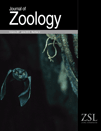
JOURNAL OF ZOOLOGY
Pioneering insights into the dynamics of animal ecosystems.JOURNAL OF ZOOLOGY, published by Wiley, stands as a premier scholarly journal in the fields of Animal Science and Zoology, renowned for its outstanding contributions to the knowledge of animal biology and ecology. With an impressive impact factor and a strong ranking in the Q1 category for Animal Science and Zoology, as well as Q2 for Ecology, Evolution, Behavior, and Systematics, the journal rigorously engages with both foundational research and groundbreaking discoveries since its inception in 1830. Located in Hoboken, New Jersey, this journal is dedicated to fostering the academic community's understanding of zoological sciences, providing access to important research that shapes wildlife conservation efforts and ecological studies. Although the journal does not currently offer open access options, it continues to attract significant attention, as evidenced by its strong Scopus rankings in related categories. Researchers, professionals, and students will find invaluable resources in the JOURNAL OF ZOOLOGY to advance their understanding of animal life and the ecological challenges it faces today.
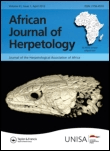
AFRICAN JOURNAL OF HERPETOLOGY
Championing the Future of Herpetological StudiesThe AFRICAN JOURNAL OF HERPETOLOGY, published by TAYLOR & FRANCIS LTD, serves as a pivotal resource in the field of herpetology, encompassing the study of reptiles and amphibians. With an ISSN of 2156-4574 and an E-ISSN of 2153-3660, this journal offers a platform for researchers to disseminate their findings and advance knowledge in this dynamic area of biology. Recognized in 2023 with a category quartile ranking of Q2 in Animal Science and Zoology and Q3 in Ecology, Evolution, Behavior, and Systematics, the journal highlights impactful research to a global audience. By providing access to robust, peer-reviewed content, the journal contributes significantly to ongoing debates and discoveries, thus appealing to academics, professionals, and students alike. The journal's converged publication years, spanning from 1996 to 2000 and from 2002 to 2024, signify a long-standing commitment to the field, ensuring that emerging trends and critical issues in herpetology remain at the forefront. Engaging with this journal not only enhances your understanding of amphibian and reptile biology but also connects you to a community dedicated to the conservation and sustainable management of these vital species.

Redia-Journal of Zoology
Unveiling the mysteries of the animal kingdom.Redia-Journal of Zoology, published by the CRA-Research Centre Agrobiology & Pedology in Italy, is a distinguished academic journal dedicated to advancing the field of zoological studies through high-quality research and insightful reviews. With an ISSN of 0370-4327, this journal provides a platform for scholars and practitioners in the Agricultural and Biological Sciences to disseminate their findings and engage in meaningful discourse. Recognized in the 2023 Scopus rankings as Q2 in its category, Redia occupies a notable position within the global research community, ranked 138 out of 221 in Agricultural and Biological Sciences. The journal has a commitment to publishing original research from 2011 until 2024, contributing to the body of knowledge in diverse sub-disciplines of zoology, ecology, and conservation. While currently not open access, Redia strives to foster collaboration and discussion among researchers, making it a vital resource for advancing zoological sciences.
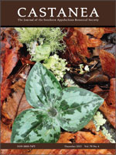
CASTANEA
Illuminating the Secrets of Southern Appalachian FloraCASTANEA is a distinguished journal published by the SOUTHERN APPALACHIAN BOTANICAL SOCIETY in affiliation with NEWBERRY COLLEGE. With an ISSN of 0008-7475 and an E-ISSN of 1938-4386, this esteemed publication serves as a vital platform for researchers and practitioners in the field of Plant Science. It has been circulating since 1982, and its scope focuses on the study of trees, their ecology, and conservation, thereby contributing significant insights into the biodiversity of the Southern Appalachian region and beyond. Despite its current ranking in the Q4 quartile and the 5th percentile in the Scopus Agricultural and Biological Sciences category, CASTANEA is committed to advancing knowledge and fostering a deeper understanding of plant sciences among academics and students alike. The journal does not currently offer Open Access options, maintaining a traditional subscription model that allows for carefully curated and peer-reviewed content. As you explore the advances in plant biology through CASTANEA, you will find an invaluable resource that supports both emerging and established scholars in their research endeavors.
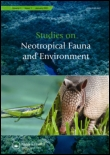
STUDIES ON NEOTROPICAL FAUNA AND ENVIRONMENT
Bridging Theory and Practice in Animal Science and EcologySTUDIES ON NEOTROPICAL FAUNA AND ENVIRONMENT is a distinguished academic journal published by Taylor & Francis Ltd, dedicated to advancing the fields of Animal Science, Zoology, and Ecology. With an ISSN of 0165-0521 and an E-ISSN of 1744-5140, this journal has been a significant outlet for scholarly research since its inception in 1976, continuing to provide critical insights into neotropical biodiversity and the environmental intricacies of this rich ecological region through 2024. Recognized in the Q3 category for both Animal Science and Ecology, the journal ranks at #232/490 in Animal Science and Zoology and #402/721 in Ecology, marking it as a valuable resource for researchers, professionals, and students interested in ecological and zoological studies. By offering a platform for innovative research and comprehensive reviews, the journal aims to bridge the gap between theory and practical application, facilitating a deeper understanding of the unique challenges and conservation strategies relevant to neotropical ecosystems. Although not an open-access journal, it plays a crucial role in fostering academic discourse and knowledge dissemination in its field, ensuring that critical advancements in understanding neotropical fauna and environmental dynamics reach a diverse and engaged audience.
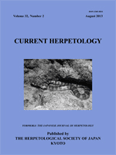
CURRENT HERPETOLOGY
Unveiling the mysteries of herpetofauna through rigorous science.CURRENT HERPETOLOGY is a leading journal dedicated to the study of reptiles and amphibians, published by the Herpetological Society of Japan in collaboration with the Graduate School of Science at Kyoto University. With its ISSN 1345-5834 and E-ISSN 1881-1019, this journal serves as a vital platform for sharing significant research findings in the field of herpetology. The journal has been continuously contributing to the scientific community since its inception in 2000, with a scope that embraces diverse topics including ecology, behavior, conservation, and physiology of herpetofauna. Recognized for its scholarly impact, CURRENT HERPETOLOGY holds a commendable position within the Q3 quartile in the Animal Science and Zoology category, ranking 350 out of 490 according to Scopus metrics. Although it is not currently an open-access journal, it caters to an audience comprising researchers, professionals, and students looking to deepen their understanding and engage with cutting-edge studies. Based in Japan, at the Department of Zoology in Kyoto, this journal is poised to foster advancements in herpetological research and promote global collaboration in this vital area of science.

AMPHIBIA-REPTILIA
Fostering Conservation through Rigorous ResearchAMPHIBIA-REPTILIA, published by BRILL, stands as a prominent journal in the field of zoology and ecology, specializing in herpetology, the study of amphibians and reptiles. With a rich history since its inception in 1980, this journal aims to disseminate high-quality, peer-reviewed research that advances our understanding of these vital vertebrate groups. Holding a commendable 2023 Q2 ranking in both Animal Science and Zoology and Ecology, Evolution, Behavior and Systematics, it is recognized for its contributions to the scientific community. Researchers are encouraged to submit their manuscripts, benefiting from the journal's commitment to academic excellence, which is showcased in its operational transparency and rigorous editorial process. Though currently not open access, the journal's findings are pivotal for advancing conservation efforts and ecological studies, making it an essential resource for scholars, professionals, and students invested in these important fields.
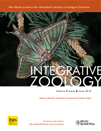
Integrative Zoology
Exploring the Depths of Animal BiologyIntegrative Zoology is a distinguished journal published by WILEY, focusing on advancing the field of zoological sciences through the integration of various biological disciplines. With both ISSN 1749-4877 and E-ISSN 1749-4869 identifiers, this journal features research that fosters a deeper understanding of animal biology, ecology, and conservation strategies. As a testament to its impact, Integrative Zoology is recognized within the Q1 category of Animal Science and Zoology in 2023, ranking an impressive #27 out of 490 journals in its field, placing it in the 94th percentile among peers. Published in the United Kingdom, this journal not only serves as a critical platform for novel research but also engages a global audience, inviting submissions that bridge theoretical and practical aspects of zoology. While not entirely open access, the journal remains committed to disseminating high-quality research that contributes substantially to scientific advancements. Through its continuous publication since 2008, Integrative Zoology aims to inspire researchers, educators, and students alike, making it a cornerstone for anyone passionate about the complexities of animal life.

RUSSIAN JOURNAL OF HERPETOLOGY
Illuminating the Evolutionary Pathways of Reptiles and AmphibiansRUSSIAN JOURNAL OF HERPETOLOGY is a prominent scholarly publication dedicated to the field of herpetology, focusing on the study of reptiles and amphibians. Published by FOLIUM PUBL CO in the Russian Federation, this journal aims to foster the exchange of knowledge and research in animal science, ecology, evolution, and behavior. With its ISSN 1026-2296 and a significant commitment to high-quality academic discourse, the journal maintains a respectable standing within the Q3 quartile in both Animal Science and Zoology, as well as in Ecology, Evolution, Behavior, and Systematics. This attributes to its Scopus rank among leading journals in related fields, enhancing its visibility and influence. Spanning from 2014 through 2024, it publishes rigorous research that explores the diversity, biology, and conservation of herpetofauna, making it a vital resource for researchers, professionals, and students alike who are invested in the ecological and evolutionary dynamics of these species.
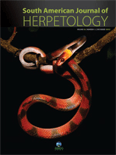
South American Journal of Herpetology
Bridging regional insights with global herpetological research.South American Journal of Herpetology is a vital resource in the field of herpetology, published by the Sociedade Brasileira de Herpetologia. Established to advance the study of amphibians and reptiles, this journal aims to bridge the gap between regional science and global research. As an influential platform operating from Brazil, it serves as a forum for researchers, professionals, and students dedicated to understanding the rich diversity of South American herpetofauna. With a focus on innovative studies and critical reviews, the journal has been categorized in the Q3 quartile for both Animal Science and Zoology and Ecology, Evolution, Behavior and Systematics as of 2023, indicating a growing impact within these disciplines. Although currently not open access, it offers unique insights into the ecological and evolutionary aspects of herpetology, contributing significantly to discussions on conservation and biodiversity. The journal is housed at the prestigious Museu de Zoologia da Universidade de São Paulo, ensuring high academic standards and engagement with leading researchers in the field.